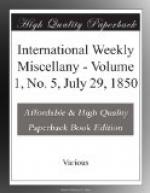For
he has learned
To look on Nature, not as in the hour
Of thoughtless youth, but hearing oftentimes
The still, sad, music of Humanity,
Nor harsh nor grating, though of ample
power
To chasten and subdue.
The reader will find numerous striking exemplifications of this spirit as he goes along with our author. From the serene heights of old age, “the gray-haired boy whose heart can never grow old,” ever and anon regrets and rebukes some egotism or assumption, or petty irritation of bygone years, and confesses that he can now cheerfully accept the fortunes, good and bad, which have occurred to him, “with the disposition to believe them the best that could have happened, whether for the correction of what was wrong in him, or the improvement of what was right.”
The concluding chapters contain a brief account of Mr. Hunt’s occupations during the last twenty-five years; his residence successively at Highgate, Hampstead, Chelsea, and Kensington, and of his literary labors while living at these places. Many interesting topics are touched upon—among which we point to his remarks on the difficulties experienced by him in meeting the literary requirements of the day, and the peculiar demands of editors; his opinion of Mr. Carlyle; the present condition of the stage, the absurd pretensions of actors, and the delusions attempted respecting the “legitimate” drama; the question of the laureateship, and his own qualifications for holding that office; his habits of reading; and finally an avowal of his religious opinions. We miss some account of Mr. Hazlitt. Surely we had a better right to expect at the hands of Hunt a sketch of that remarkable writer, than of Coleridge, of whom he saw comparatively little. We also expected to find some allusion to the “Round Table,” a series of essays which appeared in the Examiner, about 1815, written chiefly by Hazlitt, but amongst which are about a dozen by Hunt himself, some of them perhaps the best things he has written: we need only allude to “A Day by the Fire,” a paper eminently characteristic of the author, and we doubt not fully appreciated by those who know his writings. Hunt regrets having re-cast the “Story of Rimini,” and tells us that a new edition of the poem is meditated, in which, while retaining the improvement in the versification, he proposes to restore the narrative to its first course.




